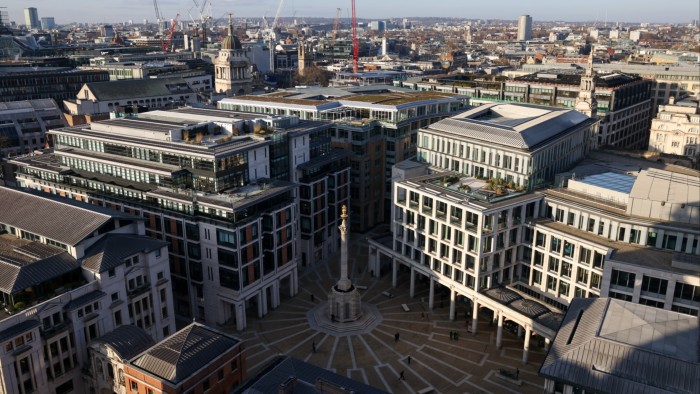Unlock the Editor’s Digest for free
Roula Khalaf, Editor of the FT, selects her favourite stories in this weekly newsletter.
The writer is senior adviser at Engine AI and Investa, and former chief global equity strategist at Citigroup
“The job of an investment banker is to hang out where the money is.” That was the steer from a former colleague many years ago. Maybe obvious and intuitive but the best advice often is.
I can tell you where the money now isn’t — UK active equity funds. According to Goldman Sachs, some £150bn has flowed out of them since 2016.
There are many reasons for this exodus. Within equities, disappointing performance from the UK market pushed investors to chase better returns elsewhere. Lacklustre relative performance and high fees drove capital into cheaper passive funds. A historic home bias created a desire to diversify into other equity markets.
As defined benefit pension funds matured and adopted Liability Driven Investment strategies that seek to match income with payouts to pensions, they sold UK equities and bought gilts. These moves were accelerated by regulatory and accounting changes. Gordon Brown’s 1997 removal of the dividend tax credit didn’t help. Neither did Brexit.
Pension and endowment funds, attracted by the strong returns of “Yale model” portfolios, shifted capital out of public markets towards alternative assets such as real estate, infrastructure, hedge funds and private equity.
Many of these themes have also played out in the US. Morningstar data suggests that the rise of passive investing means only 37 per cent of US equity fund assets are now actively managed, down from 60 per cent in 2015.
My key point is that the big losers of capital in recent years have been active equity managers, even in the US. These natural buyers of IPOs have been starved of funds. Passive equity funds enjoyed inflows but rarely participate in new issues. They can only buy once the stock is included in the index they track, which usually takes time. It seems that IPOs have become an unintended casualty of the rise in passive investing.
A healthy new issuance market needs inflows into active equity funds. The UK has seen unrelenting outflows. The US has seen some equity inflows, but to passive not active funds. This capital has helped to re-rate the big tech stocks heavily weighted in the S&P 500, but has not found its way to those fund managers who can buy the next new issue. Hence the strange decoupling of the key US stock indices, which are hitting new highs, and IPOs, which remain in the doldrums.
India is one country where a rising equity market has been associated with frenetic new issuance. But here, most of the flows have been into active funds.
There has been much soul-searching about the demise of equity issuance in the UK. The government has been lobbied to adopt policies that would channel local savings back into the domestic stock market. If much of this capital goes into passive funds, as seems likely, there will probably be a re-rating of existing UK large-cap stocks. This might discourage them from shifting their listings to the US, but it is unlikely to revive the domestic IPO market. To do that, policymakers need to divert capital towards those fund managers more likely to put it into new issues.
Private equity funds have attracted some of the outflows from active public equity funds. This has funded their takeover war chests while also derating stock markets, so providing cheap targets. However, this can only go so far. The PE business model also needs a healthy IPO market to return capital to end investors. With active public equity managers in such decline, that exit route has diminished.
Maybe the answer is for companies to stay private. Avoid the hassle of a public listing and the short-term pressures of a fluctuating share price. After all, there’s plenty of capital available in the private markets. David Solomon, chief executive of Goldman Sachs, provided exactly that advice recently, and he definitely knows where the money is.
“If you are running a company that’s working and it’s growing, if you take it public, it will force you to change the way to run it and you really should do that with great caution,” he said, pointing out you now can get capital privately at scale.
Ongoing outflows have important consequences for public equity markets. There has been less issuance of new shares, and more old shares have been retired, so shrinking the available investment pool. To many, this de-equitisation indicates a sickly market. I see it as a necessary reduction in the supply of public equity given the drop in demand, particularly via active funds. Ultimately, this should be supportive of share prices.
I spent the first part of my career as a UK strategist. My core clients were UK active equity managers. As their outflows accelerated, I realised that I needed to hang out somewhere else, so shifted to a more global mandate. A career-extending move, but I should have moved to private markets. That’s where the money really is.
Read the full article here




